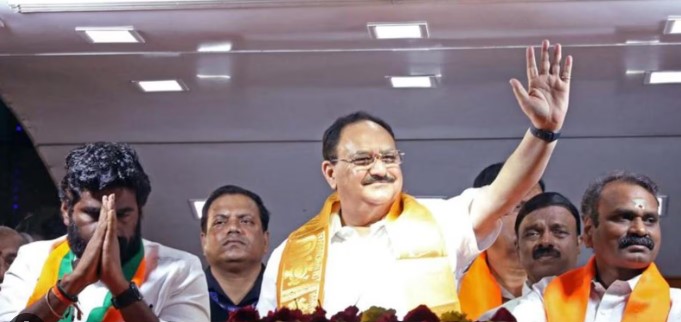In a sharp rebuke, BJP National President JP Nadda has criticised the DMK-led government’s handling of the restrictions imposed on the ongoing yatra and public meeting organised by party leader Annamalai in Chennai. Nadda likened the restrictions to the dark days of the Emergency era, expressing concerns about the limitations placed on political activities.
Annamalai’s “En maan En Makkal” (My soil, My people) yatra, initiated on July 29, 2023 in Rameswaram, has successfully covered 200 assembly constituencies. The yatra aimed to traverse 22 segments in Chennai before concluding in Palladam on February 25th, where Prime Minister Modi is expected to participate.
However, the Greater Chennai police denied permission for the yatra on main thoroughfares, citing potential traffic congestion and inconvenience to the public. Undeterred by the restrictions, the BJP proceeded with its plans and organised a public meeting in the Mint area on February 11. The gathering marked the yatra’s milestone of reaching its 200th constituency in Chennai.
Addressing the media, Nadda recounted his experience, stating, “When I came, the market was shut down, street lights were switched off, and there was a huge platoon of police. This leadership lacks wisdom. It made me remember the Emergency days. See how police have made them shut down markets, turn off street lights, and deploy a massive police force. Is this democracy? Is this the tradition of Tamil Nadu?”
Nadda continued, expressing his disappointment in the current state of leadership in Tamil Nadu, a state he praised for its rich culture, tradition, and language. He stated, “Today it has poor leadership. The contribution of Tamil Nadu can never be forgotten, but today the people of Tamil Nadu have poor leadership. When it is not the tradition of Tamil Nadu, such leaders should not be there in Tamil Nadu.”
The BJP National Chief predicted a shift in political power, asserting, “Now the time has come when DMK’s lights will switch off. I would like to tell Mr. Stalin, the day is not far when you will be out.”
Nadda did not mince words in his criticism of the DMK, stating, “DMK stands for Dynasty, Money Swindling, and Katta Panchayat (Kangaroo Court).” He accused the party of practicing dynastic politics and corruption.
Turning the focus to Prime Minister Narendra Modi, Nadda emphasised the special significance of Tamil Nadu for the Prime Minister and the BJP. He acknowledged the rich contribution of Tamil Nadu in nation-building and credited Modi for bringing development and transparency to both the nation and the state.
Nadda highlighted the transformative impact of Modi’s leadership, noting, “He has changed the political culture. At one point, politicians were not accountable. Now they are. If they are not, people will throw them out.”
Nadda highlighted the installation of the Sengol (Sceptre) in the new Parliament in Delhi last May as a symbol of the Modi government’s commitment to upholding democratic values. He also noted the posthumous honouring of agricultural scientist Dr. MS Swaminathan with the Bharat Ratna after his passing in Chennai last September.
Criticising the DMK’s leadership, Nadda pointed out the continued presence of jailed minister Senthil Balaji in Stalin’s cabinet without a portfolio, questioning the ethics of such a decision.
Earlier, during the same event, Annamalai, a prominent BJP leader, drew attention to the prevalence of dynastic politics within the DMK. He highlighted that all three MPs in Chennai—North, South, and Central—are offspring of DMK leaders, citing examples such as South Chennai MP Tamizhachi Thangapandian, daughter of Thangapandian and sister of TN Finance and Industries Minister Thangam Thennaras, and Central Chennai MP Dayanidhi Maran, son of Murasoli Maran from the Kalaignar family.
Additionally, Annamalai pointed out that North Chennai MP Kalanidhi Veerasamy is the son of DMK veteran Arcot N Veerasamy.
In contrast, Nadda reiterated the BJP’s achievements, from the inauguration of the Ram Temple in Ayodhya to the abrogation of Article 370 in Jammu and Kashmir, emphasising the party’s commitment to governance free from dynastic influences.
The remarks by Nadda and Annamalai underscore the ongoing political debate surrounding dynastic politics in India, particularly in the context of Tamil Nadu’s political landscape. As the state gears up for upcoming elections, the issue of dynastic succession remains a contentious topic, shaping public discourse and electoral dynamics.



















Comments